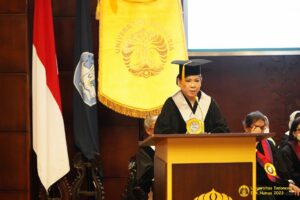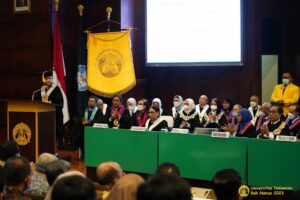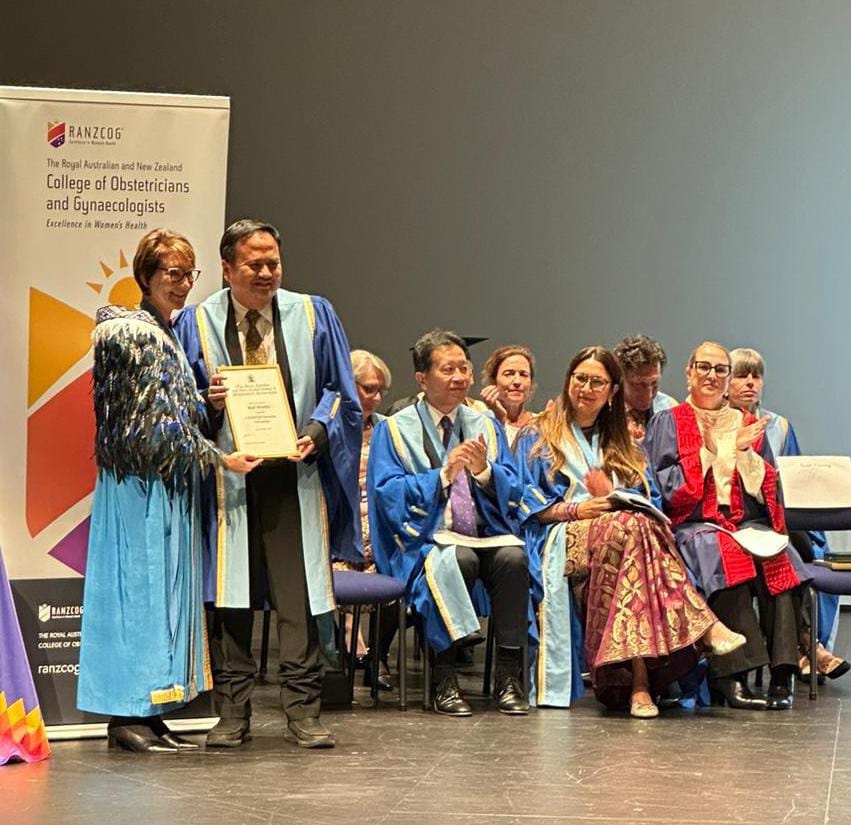
“Indonesia as the fourth most populous country in the world, I believe, we will be able to achieve the Vision of Golden Indonesia 2045 if we manage and empower the population as an engine of economic growth. The science of demography will help Indonesia in empowering the population as a growth engine and as the ultimate resource in achieving the Vision of Golden Indonesia 2045. The science of demography contributes to the understanding to develop this country through population management,” said Prof. Omas Bulan Samosir, Ph.D., in her inaugural speech as Professor in the Field of Demographic Economics, Faculty of Economics and Business, Universitas Indonesia (FEB UI), on Wednesday (15/3).
She further explained, apart from being a science, demography plays an important role in the welfare of mankind (demography is the core) and the welfare of the Indonesian population. Demography becomes a science and contributes to the human mind regarding the determinants of population growth, data collection, economic growth and welfare, development planning and implementation programs, the business world, and the future of civilization.
In her presentation, Prof. Omas said demographic changes had an impact on a country’s socioeconomic progress. There is a close reciprocal relationship between demographic dynamics and development. “The dynamics of demography affect the well-being of the population through social, economic, and environmental development. Meanwhile, the welfare of the population influences demographic dynamics,” said Prof. Omas.
She added, the world’s population will experience two big trends in the future, which are more young people in developing countries and more old people in rich countries. That is why, she said, Indonesia needs to have a population projection to take advantage of this demographic bonus.

Indonesia’s demographics show that the population growth rate in the past was caused by a high birth rate. A better understanding of the role of demography in the welfare of the population in Indonesia has given rise to population-centered development policies, the inclusion of the issue of demographic bonuses in development planning documents, and the dissemination of megatrends and demographic resilience issues.
Societies that have demographic resilience, that is, those who have the skills, tools, political will, and public support to manage them in such a way and will be able to reduce potential negative impacts on individuals, society, the economy, and the environment. Then they take advantage of the opportunities that come with demographic changes for people, prosperity, and the planet.
“The science of demography can contribute to this country regarding population management. We need to think about strategies to manage fertility, mortality, and migration. This knowledge will help Indonesia as a cultured country to map and maintain languages that are extinct and endangered. In addition, the science of demography helps Indonesia in planning and conducting development from, by, and for the population,” said Prof. Omas, closing her speech.

The inauguration procession which was led directly by UI Rector Prof. Ari Kuncoro, SE, MA, Ph.D., also inaugurated two other professors besides Prof. Omas, namely Professor of the Faculty of Computer Sciences (Fasilkom) UI Prof. Dr. dr. Kasiyah, M.Sc. and Professor of the Faculty of Humanities (FIB) UI Prof. Dr. Maman Lesmana, S.S., M.Hum. This procession was held at Balai Sidang, UI Campus, Depok, and broadcast virtually via Universitas Indonesia and UI Teve Youtube channels. The inauguration was also attended by the Rector of Universitas Kristen Indonesia Dr. Dhaniswara K. Harjono, S.H., M.H; Director of the Postgraduate Program, Universitas Kristen Indonesia, Prof. Dr. dr. Bernadetha Nadeak, MPd, PA; and Chairman of the Academic Senate, Universitas Kristen Indonesia, Prof. Atmonobudi Soebagio, MSEE, Ph.D.
Prof. Omas completed her undergraduate in Mathematics, at the Department of Mathematics, Faculty of Mathematics and Natural Sciences (FMIPA) UI, in 1988. In 1994, she succeeded in earning the title of Philosophy Doctor in Demography, at the Department of Social Statistics, Faculty of Social Sciences, University of Southampton, Southampton, United Kingdom. Several of her scientific works in recent years include Kesenjangan Digital dan Kesenjangan Upah di Indonesia Sebelum dan pada Masa Pandemi COVID-19: Analisis Data Hasil Survei Angkatan Kerja Nasional 2019–2021 (2023), Beban Penyakit dan Pertumbuhan Ekonomi (2022), dan Pola Pemberian Makan pada Bayi dan Anak Usia 6–23 Bulan dan Stunting di Indonesia: Analisis Lanjut Hasil Riset Kesehatan Dasar 2018 (2021).
See more:



